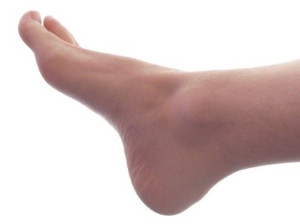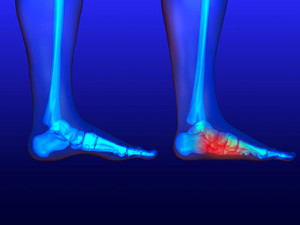Items filtered by date: June 2017
Falcon’s Julio Jones Undergoes Foot Surgery
 Julio Jones of the Atlanta Falcons has had several foot injuries throughout his career. He suffered two different foot fractures in 2011 and 2013, and is currently recovering from a bunion removal surgery that he had in March. Jones is three months into his rehabilitation timetable, and hopes to be ready by training camp in July. In regards to his injury Jones stated, “It was good just to be back out on the grass and just testing it out, I felt great. Just working my way into it; just easing into it.”
Julio Jones of the Atlanta Falcons has had several foot injuries throughout his career. He suffered two different foot fractures in 2011 and 2013, and is currently recovering from a bunion removal surgery that he had in March. Jones is three months into his rehabilitation timetable, and hopes to be ready by training camp in July. In regards to his injury Jones stated, “It was good just to be back out on the grass and just testing it out, I felt great. Just working my way into it; just easing into it.”
Foot surgery is sometimes necessary to treat a foot ailment. To learn more, contact Harvey Jacobs, DPM of Quality Foot Care Center. Our doctor will assist you with all of your foot and ankle needs.
When Is Surgery Necessary?
Foot and ankle surgery is generally reserved for cases in which less invasive, conservative procedures have failed to alleviate the problem. Some of the cases in which surgery may be necessary include:
- Removing foot deformities like bunions and bone spurs
- Severe arthritis that has caused bone issues
- Cosmetic reconstruction
What Types of Surgery Are There?
The type of surgery you receive will depend on the nature of the problem you have. Some of the possible surgeries include:
- Bunionectomy for painful bunions
- Surgical fusion for realignment of bones
- Neuropathy decompression surgery to treat nerve damage
Benefits of Surgery
Although surgery is usually a last resort, it can provide more complete pain relief compared to non-surgical methods and may allow you to finally resume full activity.
Surgical techniques have also become increasingly sophisticated. Techniques like endoscopic surgery allow for smaller incisions and faster recovery times.
If you have any questions please feel free to contact our office located in Somerset, NJ . We offer the newest diagnostic and treatment technologies for all your foot and ankle needs.
Falcon’s Julio Jones Undergoes Foot Surgery
 Julio Jones of the Atlanta Falcons has had several foot injuries throughout his career. He suffered two different foot fractures in 2011 and 2013, and is currently recovering from a bunion removal surgery that he had in March. Jones is three months into his rehabilitation timetable, and hopes to be ready by training camp in July. In regards to his injury Jones stated, “It was good just to be back out on the grass and just testing it out, I felt great. Just working my way into it; just easing into it.”
Julio Jones of the Atlanta Falcons has had several foot injuries throughout his career. He suffered two different foot fractures in 2011 and 2013, and is currently recovering from a bunion removal surgery that he had in March. Jones is three months into his rehabilitation timetable, and hopes to be ready by training camp in July. In regards to his injury Jones stated, “It was good just to be back out on the grass and just testing it out, I felt great. Just working my way into it; just easing into it.”
Foot surgery is sometimes necessary to treat a foot ailment. To learn more, contact one of our podiatrists of Quality Foot Care Center. Our doctors will assist you with all of your foot and ankle needs.
When Is Surgery Necessary?
Foot and ankle surgery is generally reserved for cases in which less invasive, conservative procedures have failed to alleviate the problem. Some of the cases in which surgery may be necessary include:
- Removing foot deformities like bunions and bone spurs
- Severe arthritis that has caused bone issues
- Cosmetic reconstruction
What Types of Surgery Are There?
The type of surgery you receive will depend on the nature of the problem you have. Some of the possible surgeries include:
- Bunionectomy for painful bunions
- Surgical fusion for realignment of bones
- Neuropathy decompression surgery to treat nerve damage
Benefits of Surgery
Although surgery is usually a last resort, it can provide more complete pain relief compared to non-surgical methods and may allow you to finally resume full activity.
Surgical techniques have also become increasingly sophisticated. Techniques like endoscopic surgery allow for smaller incisions and faster recovery times.
If you have any questions please feel free to contact our office located in Somerset, NJ. We offer the newest diagnostic and treatment technologies for all your foot and ankle needs.
Read more about Foot SurgeryDealing with Plantar Warts
 Plantar warts are caused by the human papillomavirus (HPV). This virus thrives in warm, damp environments such as gym showers or other public facilities. In special cases, untreated plantar warts may develop into methicillin-resistant staphylococcus aureus (MRSA). Although sometimes plantar warts may go away on their own, if they are chronic or become painful you should consult with a podiatrist to go over treatment options.
Plantar warts are caused by the human papillomavirus (HPV). This virus thrives in warm, damp environments such as gym showers or other public facilities. In special cases, untreated plantar warts may develop into methicillin-resistant staphylococcus aureus (MRSA). Although sometimes plantar warts may go away on their own, if they are chronic or become painful you should consult with a podiatrist to go over treatment options.
Plantar warts can be very uncomfortable. If you need your feet checked, contact Harvey Jacobs, DPM from Quality Foot Care Center. Our doctor will assist you with all of your foot and ankle needs.
About Plantar Warts
Plantar warts are the result of HPV, or human papillomavirus, getting into open wounds on the feet. They are mostly found on the heels or balls of the feet.
While plantar warts are generally harmless, those experiencing excessive pain or those suffering from diabetes or a compromised immune system require immediate medical care. Plantar warts are easily diagnosed, usually through scraping off a bit of rough skin or by getting a biopsy.
Symptoms
- Lesions on the bottom of your feet, usually rough and grainy
- Hard or thick callused spots
- Wart seeds, which are small clotted blood vessels that look like little black spots
- Pain, discomfort, or tenderness of your feet when walking or standing
Treatment
- Freezing
- Electric tool removal
- Laser Treatment
- Topical Creams (prescription only)
- Over-the-counter medications
To help prevent developing plantar warts, avoid walking barefoot over abrasive surfaces that can cause cuts or wounds for HPV to get into. Avoiding direct contact with other warts, as well as not picking or rubbing existing warts, can help prevent the further spread of plantar warts. However, if you think you have developed plantar warts, speak to your podiatrist. He or she can diagnose the warts on your feet and recommend the appropriate treatment options.
If you have any questions please feel free to contact our office located in Somerset, NJ . We offer the newest diagnostic and treatment technologies for all your foot and ankle needs.
Dealing with Plantar Warts
 Plantar warts are caused by the human papillomavirus (HPV). This virus thrives in warm, damp environments such as gym showers or other public facilities. In special cases, untreated plantar warts may develop into methicillin-resistant staphylococcus aureus (MRSA). Although sometimes plantar warts may go away on their own, if they are chronic or become painful you should consult with a podiatrist to go over treatment options.
Plantar warts are caused by the human papillomavirus (HPV). This virus thrives in warm, damp environments such as gym showers or other public facilities. In special cases, untreated plantar warts may develop into methicillin-resistant staphylococcus aureus (MRSA). Although sometimes plantar warts may go away on their own, if they are chronic or become painful you should consult with a podiatrist to go over treatment options.
Plantar warts can be very uncomfortable. If you need your feet checked, contact one of our podiatrists from Quality Foot Care Center. Our doctors will assist you with all of your foot and ankle needs.
About Plantar Warts
Plantar warts are the result of HPV, or human papillomavirus, getting into open wounds on the feet. They are mostly found on the heels or balls of the feet.
While plantar warts are generally harmless, those experiencing excessive pain or those suffering from diabetes or a compromised immune system require immediate medical care. Plantar warts are easily diagnosed, usually through scraping off a bit of rough skin or by getting a biopsy.
Symptoms
- Lesions on the bottom of your feet, usually rough and grainy
- Hard or thick callused spots
- Wart seeds, which are small clotted blood vessels that look like little black spots
- Pain, discomfort, or tenderness of your feet when walking or standing
Treatment
- Freezing
- Electric tool removal
- Laser Treatment
- Topical Creams (prescription only)
- Over-the-counter medications
To help prevent developing plantar warts, avoid walking barefoot over abrasive surfaces that can cause cuts or wounds for HPV to get into. Avoiding direct contact with other warts, as well as not picking or rubbing existing warts, can help prevent the further spread of plantar warts. However, if you think you have developed plantar warts, speak to your podiatrist. He or she can diagnose the warts on your feet and recommend the appropriate treatment options.
If you have any questions please feel free to contact our office located in Somerset, NJ. We offer the newest diagnostic and treatment technologies for all your foot and ankle needs.
Read more about All About Plantar WartsLiving with Flat Feet
 “About 20-30% of the population suffers from fallen arches in one or both feet.” Flat feet can be very problematic for runners. Those with flat feet have to be careful while training, stretching, and selecting running shoes. They have to know and pay attention to the warning signs of potential foot problems. Those with flat feet may also have a condition called plantar fasciitis, however stretching is the best way to prevent onset of this. Having shoes that fit properly is important for everyone, but it is especially important for those who have flat feet.
“About 20-30% of the population suffers from fallen arches in one or both feet.” Flat feet can be very problematic for runners. Those with flat feet have to be careful while training, stretching, and selecting running shoes. They have to know and pay attention to the warning signs of potential foot problems. Those with flat feet may also have a condition called plantar fasciitis, however stretching is the best way to prevent onset of this. Having shoes that fit properly is important for everyone, but it is especially important for those who have flat feet.
Flatfoot is a condition many people suffer from. If you have flat feet, contact Harvey Jacobs, DPM from Quality Foot Care Center. Our doctor will treat your foot and ankle needs.
What Are Flat Feet?
Flatfoot is a condition in which the arch of the foot is depressed and the sole of the foot is almost completely in contact with the ground. About 20-30% of the population generally has flat feet because their arches never formed during growth.
Conditions & Problems:
Having flat feet makes it difficult to run or walk because of the stress placed on the ankles.
Alignment – The general alignment of your legs can be disrupted, because the ankles move inward which can cause major discomfort.
Knees – If you have complications with your knees, flat feet can be a contributor to arthritis in that area.
Symptoms
- Pain around the heel or arch area
- Trouble standing on the tip toe
- Swelling around the inside of the ankle
- Flat look to one or both feet
- Having your shoes feel uneven when worn
Treatment
If you are experiencing pain and stress on the foot you may weaken the posterior tibial tendon, which runs around the inside of the ankle.
If you have any questions please feel free to contact our office located in Somerset, NJ . We offer the newest diagnostic and treatment technologies for all your foot and ankle needs.
Living with Flat Feet
 “About 20-30% of the population suffers from fallen arches in one or both feet.” Flat feet can be very problematic for runners. Those with flat feet have to be careful while training, stretching, and selecting running shoes. They have to know and pay attention to the warning signs of potential foot problems. Those with flat feet may also have a condition called plantar fasciitis, however stretching is the best way to prevent onset of this. Having shoes that fit properly is important for everyone, but it is especially important for those who have flat feet.
“About 20-30% of the population suffers from fallen arches in one or both feet.” Flat feet can be very problematic for runners. Those with flat feet have to be careful while training, stretching, and selecting running shoes. They have to know and pay attention to the warning signs of potential foot problems. Those with flat feet may also have a condition called plantar fasciitis, however stretching is the best way to prevent onset of this. Having shoes that fit properly is important for everyone, but it is especially important for those who have flat feet.
Flatfoot is a condition many people suffer from. If you have flat feet, contact one of our podiatrists from Quality Foot Care Center. Our doctors will treat your foot and ankle needs.
What Are Flat Feet?
Flatfoot is a condition in which the arch of the foot is depressed and the sole of the foot is almost completely in contact with the ground. About 20-30% of the population generally has flat feet because their arches never formed during growth.
Conditions & Problems:
Having flat feet makes it difficult to run or walk because of the stress placed on the ankles.
Alignment – The general alignment of your legs can be disrupted, because the ankles move inward which can cause major discomfort.
Knees – If you have complications with your knees, flat feet can be a contributor to arthritis in that area.
Symptoms
- Pain around the heel or arch area
- Trouble standing on the tip toe
- Swelling around the inside of the ankle
- Flat look to one or both feet
- Having your shoes feel uneven when worn
Treatment
If you are experiencing pain and stress on the foot you may weaken the posterior tibial tendon, which runs around the inside of the ankle.
If you have any questions please feel free to contact our office located in Somerset, NJ. We offer the newest diagnostic and treatment technologies for all your foot and ankle needs.
Read more about Flat FeetPainful Plantar Fasciitis
 Approximately two million people each year are diagnosed with plantar fasciitis. The plantar fascia is what supports the arch of the foot. It may become inflamed and painful when it is overused or torn. Plantar fasciitis is one of the most common foot conditions in the world and there are various forms of treatment. The condition can be treated with physical therapy, stretching, placing the foot in a boot, ice, and rest. If none of these treatment options are successful, surgery can be performed in order to create a cut in the fascia, which will relieve tension.
Approximately two million people each year are diagnosed with plantar fasciitis. The plantar fascia is what supports the arch of the foot. It may become inflamed and painful when it is overused or torn. Plantar fasciitis is one of the most common foot conditions in the world and there are various forms of treatment. The condition can be treated with physical therapy, stretching, placing the foot in a boot, ice, and rest. If none of these treatment options are successful, surgery can be performed in order to create a cut in the fascia, which will relieve tension.
Plantar fasciitis can be very painful and inconvenient. If you are experiencing heel pain or symptoms of plantar fasciitis, contact Harvey Jacobs, DPM from Quality Foot Care Center. Our doctor can provide the care you need to keep you pain-free and on your feet.
What Is Plantar Fasciitis?
Plantar fasciitis is the inflammation of the thick band of tissue that runs along the bottom of your foot, known as the plantar fascia, and causes mild to severe heel pain.
What Causes Plantar Fasciitis?
- Excessive running
- Non-supportive shoes
- Overpronation
- Repeated stretching and tearing of the plantar fascia
How Can It Be Treated?
- Conservative measures – anti-inflammatories, ice packs, stretching exercises, physical therapy, orthotic devices
- Shockwave therapy – sound waves are sent to the affected area to facilitate healing and are usually used for chronic cases of plantar fasciitis
- Surgery – usually only used as a last resort when all else fails. The plantar fascia can be surgically detached from the heel
While very treatable, plantar fasciitis is definitely not something that should be ignored. Especially in severe cases, speaking to your doctor right away is highly recommended to avoid complications and severe heel pain. Your podiatrist can work with you to provide the appropriate treatment options tailored to your condition.
If you have any questions please feel free to contact our office located in Somerset, NJ . We offer the newest diagnostic and treatment technologies for all your foot and ankle needs.
Painful Plantar Fasciitis
 Approximately two million people each year are diagnosed with plantar fasciitis. The plantar fascia is what supports the arch of the foot. It may become inflamed and painful when it is overused or torn. Plantar fasciitis is one of the most common foot conditions in the world and there are various forms of treatment. The condition can be treated with physical therapy, stretching, placing the foot in a boot, ice, and rest. If none of these treatment options are successful, surgery can be performed in order to create a cut in the fascia, which will relieve tension.
Approximately two million people each year are diagnosed with plantar fasciitis. The plantar fascia is what supports the arch of the foot. It may become inflamed and painful when it is overused or torn. Plantar fasciitis is one of the most common foot conditions in the world and there are various forms of treatment. The condition can be treated with physical therapy, stretching, placing the foot in a boot, ice, and rest. If none of these treatment options are successful, surgery can be performed in order to create a cut in the fascia, which will relieve tension.
Plantar fasciitis can be very painful and inconvenient. If you are experiencing heel pain or symptoms of plantar fasciitis, contact one of our podiatrists from Quality Foot Care Center. Our doctors can provide the care you need to keep you pain-free and on your feet.
What Is Plantar Fasciitis?
Plantar fasciitis is the inflammation of the thick band of tissue that runs along the bottom of your foot, known as the plantar fascia, and causes mild to severe heel pain.
What Causes Plantar Fasciitis?
- Excessive running
- Non-supportive shoes
- Overpronation
- Repeated stretching and tearing of the plantar fascia
How Can It Be Treated?
- Conservative measures – anti-inflammatories, ice packs, stretching exercises, physical therapy, orthotic devices
- Shockwave therapy – sound waves are sent to the affected area to facilitate healing and are usually used for chronic cases of plantar fasciitis
- Surgery – usually only used as a last resort when all else fails. The plantar fascia can be surgically detached from the heel
While very treatable, plantar fasciitis is definitely not something that should be ignored. Especially in severe cases, speaking to your doctor right away is highly recommended to avoid complications and severe heel pain. Your podiatrist can work with you to provide the appropriate treatment options tailored to your condition.
If you have any questions please feel free to contact our office located in Somerset, NJ. We offer the newest diagnostic and treatment technologies for all your foot and ankle needs.
Read more about Plantar Fasciitis